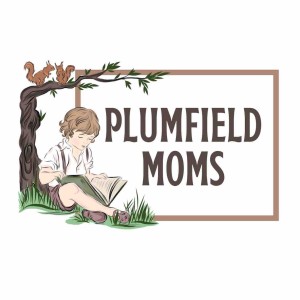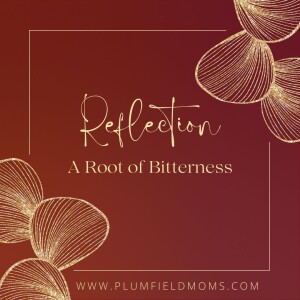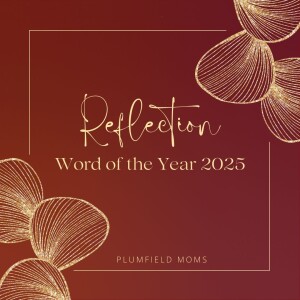Plumfield Moms
Reflection
Episodes

Saturday Jan 11, 2025
Saturday Jan 11, 2025
I remember when, several years ago, I read one of the many instances of Jesus saying, “Fear not,” and realized it wasn’t just a suggestion. It was a command. Until then, I think I had taken those “fear nots” as Jesus kindly giving me a choice. There, there, my dear, you don’t have to be afraid if you don’t want to.
Jesus spent the time of his ministry demonstrating for the disciples why they must not fear anything. He patiently showed them that nature is obedient to his will, that he has power over sickness and evil spirits, and even over death itself. That being the case, what is left for us to fear?

Saturday Jan 04, 2025
Saturday Jan 04, 2025
Our suffering is part of a bigger picture we can’t see from the ground. As the writer of Psalm 105 recounts God’s dealing with Israel, the emphasis is on the fact of God working out his word over hundreds and thousands of years. When he comes to the story of Joseph, the writer says, “When he summoned a famine on the land and broke all supply of bread, he had sent a man ahead of them.” What an astonishing realization that must have been when, after years of waiting and wondering, after all the injustice he had suffered, Joseph was able to say to his brothers, “Do not be distressed or angry with yourselves because you sold me here, for God sent me before you to preserve life . . . So it was not you who sent me here, but God” (Gen. 45:5, 8).

Saturday Dec 28, 2024
Saturday Dec 28, 2024
"What is it that Paul says he is afraid of here? He isn’t writing because he fears some of the Corinthians are on the verge of committing perjury or embezzling thousands of dollars or killing someone. He is afraid their “thoughts will be led astray from a sincere and pure devotion to Christ.” This is where all of the Big Ten horrible, obvious sins begin–with our thoughts going astray. When it comes to thoughts, does Satan really have to work very hard to start those on the wrong path?
Sincerity and purity are closely related and can sometimes be used as synonyms. Both have elements of simplicity. Something pure is simple because it is not tainted with anything. It is unadulterated. If I pour myself a glass of water that has passed through my water filter, then add a tiny grain of arsenic, drinking the water may not kill me outright, but the water can no longer be considered pure."

Saturday Dec 21, 2024
Saturday Dec 21, 2024
There will come a day when “night will be no more” and we “need no light of lamp or sun,” because the Lord God will be our light. Until then, the eyes of our hearts can be enlightened, and we can walk as children of light.
In the first chapter of Paul's letter to the Ephesians, he tells them he is praying that God will give them a spirit of wisdom and revelation in the knowledge of him, having the eyes of their hearts enlightened, that they may know the hope to which they are called; that they may know the riches of his glorious inheritance in the saints, and that they may know the immeasurable greatness of his power toward us who believe.

Saturday Dec 14, 2024
Saturday Dec 14, 2024
“Concerning this salvation, the prophets who prophesied about the grace that was to be yours searched and inquired carefully, inquiring what person or time the Spirit of Christ in them was indicating when he predicted the sufferings of Christ and the subsequent glories. It was revealed to them that they were serving not themselves but you, in the things that have now been announced to you through those who preached the good news to you by the Holy Spirit sent from heaven, things into which angels long to look” (1 Pet. 1:12).

Saturday Dec 07, 2024
Saturday Dec 07, 2024
“See to it that no one fails to obtain the grace of God; that no ‘root of bitterness’ springs up and causes trouble, and by it many become defiled” (Heb. 12:15).
It’s disturbing the way God startles you into looking at something you’ve been busy not seeing. I’ve read through Hebrews many times and noted the phrase “root of bitterness.” I’ve even looked up the Greek words to see if their meaning would add insight. What they mean is, root of bitterness. All right, then, nothing to see here. I don’t have one of those.
What brought me around to rethink this was a recent reading of Hebrews 12:1; “Therefore, since we are surrounded by so great a cloud of witnesses, let us also lay aside every weight, and sin which clings so closely, and let us run with endurance the race that is set before us.”

Saturday Nov 30, 2024
Saturday Nov 30, 2024
by Sara MasarikA few years ago, I became aware of the practice of prayerfully discerning a word of the year (or phrase) that could be used as a touchstone for the upcoming year. This word is not a charm nor an omen, but rather it is a reminder of some spiritual concept or truth that I wish to contemplate this year. It is a word to be used as an anthem and a call.
One year when we were in a time of chaos and were reeling from some great losses, we felt called to open our home to others without thought of inconvenience or cost. We felt that we were being called to radical hospitality. That year God sent so many people into our home for coffee dates, dinners, and fellowship that we were overwhelmed with grace and were blessed by so many new or deepened relationships.
The next year, we entered into a season of great turmoil. A very many things were happening and we felt like we had little control over any of it. That year we practiced radical surrender remembering who loved us beyond measure and who has counted every hair on our heads. Instead of trying to exert control that year, we simply accepted what was happening and consciously surrendered to the Holy Spirit at every turn.
The next year was one of the hardest of our lives as so many things were uncertain and our anxiety was crippling us and peace felt elusive. That year, we practiced radical trust. Instead of looking at every new challenge as a threat, we chose to look at each one as an opportunity to learn to trust God better. We actively chose to trust Him when all we wanted to do was run away and hide.
Some years have been less memorable. I remember loving the words those years, but for some reason, they don’t stand out in my memory. That is ok. They were a consolation and a battle cry in their time.
But, in November 2022, I wrote this in my mass Journal:
Hive:
noun
a beehive – a colony of bees
a place where people are busily occupied.
Verb
to enter and take possession of a hive
to reside in a close location
to store up as if in a hive
That year, bees had been following me everywhere I went. Real bees and decorative bees – on decor, on stickers, on cards and clothes. In fact, that year, people kept giving me raw honey! Somehow, I knew that the bee was always pointing me to the hive. But what was a hive?
Nonetheless, I embraced the word and thought often of St. Ambrose,whose preaching was said to be sweet as honey.
In thinking of Ambrose, I could not overlook his most famous contribution to the Church: his pastoring of Augustine from arrogant playboy and scholar to beloved Doctor of the Church. Ambrose who consoled Monica, the mother of so many tears. St. Ambrose debated with Augustine, prayed for him, and ultimately baptized him. And St. Augustine tells us in his Confessions that his conversion began with the child chanting “tolle lege” – take up and read. Somehow these doctors of the church, hives, and reading were connected.
I always choose my word at the end of the Catholic liturgical year – November. By late December that year, I began to see what hive really meant. I was being called to turn my personal library into a lending library. Like St. Ambrose, I was supposed to assist in creating an environment wherein students could tolle lege – take up and read. I was calling the bees together and I was bringing them into my hive of books and programs. And, I was to let my words be sweet as honey as I walked with and talked with world-weary mamas of many tears who needed encouragement, community, and fellowship.
This year, my word was message. I am writing this on the Solemnity of Christ the King – the last Sunday in the Catholic liturgical year. I have wrestled with this word all year and still do not feel entirely comfortable with it. I am certain that there is something to this that is important. I can sense it but, like St. Paul says, like looking through a glass darkly. I suspect that I wrote so many book reviews this year because of this word.
Normally, I begin to have a sense of my new word in September or October at the latest. This year, I have been so completely overwhelmed with the library, my son’s senior year in high school, my commitments at church, and our work at Plumfield and The Card Catalog. I am stumbling into a new liturgical year, harried, tired, distracted, discombobulated, and frankly, spiritually dry. For weeks I have been praying for discernment and have felt nothing. Truly, felt nothing. Like being dead.
And then, today, something changed. I have my word. I don’t like my word. I don’t want to see what it means. (Yes, you read that right.) I just don’t like this word at all. But, as I spent the afternoon reading Amos Fortune, Free Man, I fell asleep. I never nap. But I slept. Within seconds of curling up with my book, I was out. For an hour! And when I awoke and started reading again, this is what I read:
“Amos looked straight ahead of him, along the horse’s back. His vision narrowed to the road between the horse’s pointed ears. He knew that it was a big step that he was taking, this move to a new part of the land, far from the familiar, the known, the safe and secure. Yet he was going far, too, from the memory of being another’s chattel. From the indignity and privation and the long years of servitude. He no longer had his youth nor the stout strength of his early manhood. But, he still had his vision. A compound of words read by a little Quaker girl in a clear voice. Words that had burned themselves in his mind and had burned away the shackles hate had put to his lips: ‘unto him that loved us and hath made us kings and priests unto God.’ In his memory, he knew that he had been born a king, but it was the little Roxanna reading from the Bible who had shown him the only way he could become a king. So he had lived his life thereafter and so he would continue to live it so long as strength and manhood lasted.”
This passage cut through me like a hot knife.
This morning, my pastor preached on the very same thing. In Christ the King, we see Christ who has two thrones. The throne of the cross which teaches us self-sacrifice and obedience. And, the throne of glory in Heaven, which teaches us the power of intercessory prayer. We are called to unite with Christ and imitate him in both of those thrones. Additionally, as the baptized, we are made new and we share in the Old Testament anointing of priest, prophet, and king. Like Amos, we are called to live as good kings who live like Christ.
Being American and a woman, the idea of being a “king” has always been surreal and strange to me. Honestly, I have mostly ignored it. But, apparently, this is the year when I am going to meet this truth face to face.
My word for this year is kingship. And, as I so often say, I cannot wait to see what God has planned for that! I cannot wait to see how this is going to impact my work, my vocation, our library, and my life.
https://plumfieldmoms.com/plumfield-moms-reflections/word-of-the-year-2025

Saturday Nov 23, 2024
Saturday Nov 23, 2024
“O death, where is your victory? O death, where is your sting?”
The sting of death is sin, and the power of sin is the law. But thanks be to God, who gives us the victory through our Lord Jesus Christ.

Saturday Nov 16, 2024
Saturday Nov 16, 2024
“Whoever says he abides in him ought to walk in the same way in which he walked” (1 John 2:6).
The apostle John began his first letter by reminding us that he was an eyewitness to Jesus’s life on earth. He adamantly proclaimed that Jesus came in the flesh so we can have fellowship, along with John, in the Father and in Jesus the Christ.
But saying we have that fellowship isn’t enough. After some severe pronouncements about the opposition of darkness and light, truth and lies, John made the statement that whoever says he abides in Jesus ought to walk in the same way in which he walked.

Saturday Nov 09, 2024
Saturday Nov 09, 2024
"One of the most disturbing instances of idol worship in the Old Testament is when the Israelites were waiting at the foot of Mt. Sinai for Moses to come back down. They decided Moses wasn’t coming back, so they demanded that Aaron make them a god. And he did!
'And they made a calf in those days, and offered a sacrifice to the idol and were rejoicing in the works of their hands' (Acts 7:41).
It’s easy for us to wonder what in the world was wrong with those Israelites. They had recently witnessed their Creator miraculously plague their captors. They had seen the cloud that baffled the Egyptian army while the entire nation of Israel crossed the Red Sea on dry land! They had eaten manna and had drunk water that poured from a rock.
And yet, when circumstances became a bit uncomfortable, the people who had witnessed God’s mighty works reverted to their ingrained way of thinking. Like children not yet able to comprehend anything they can’t see or touch, they preferred the work of their own hands. Oh, those silly, childish Israelites! Thank God we aren’t like that.
Truly, if you can say without hesitation you aren’t like that, thank God. I feel the need to examine my heart."